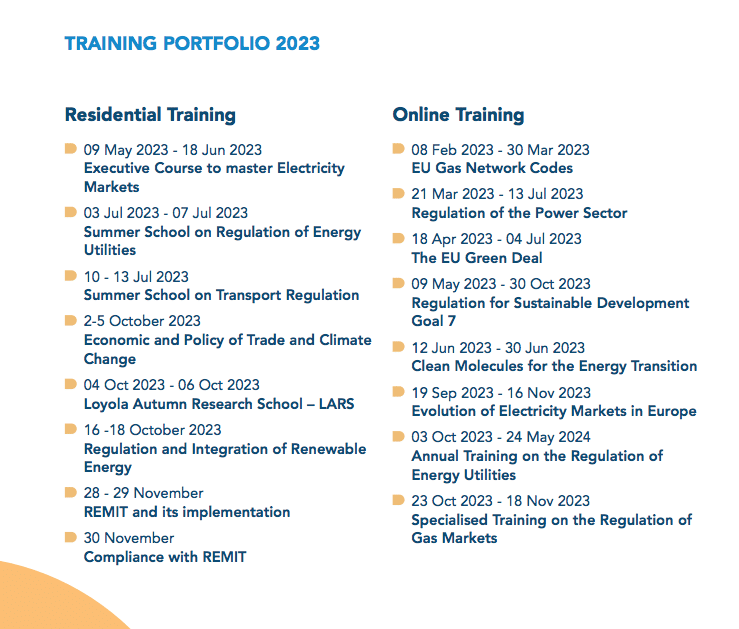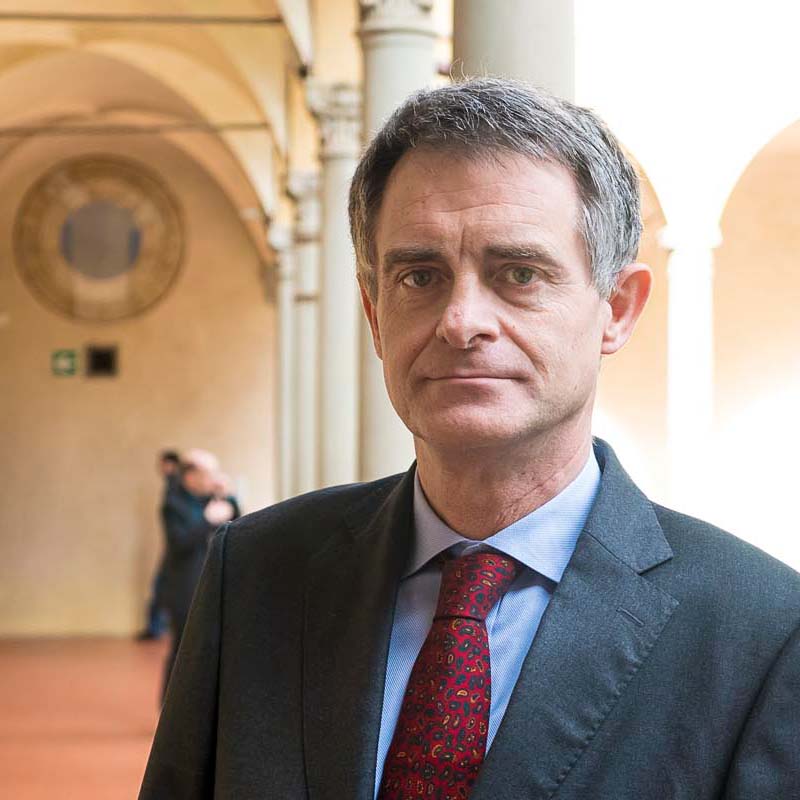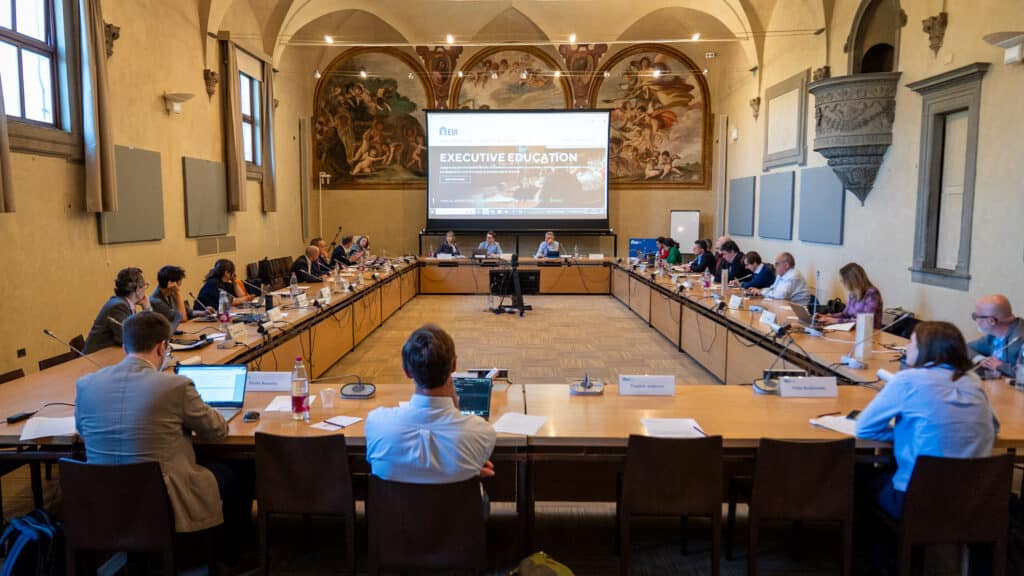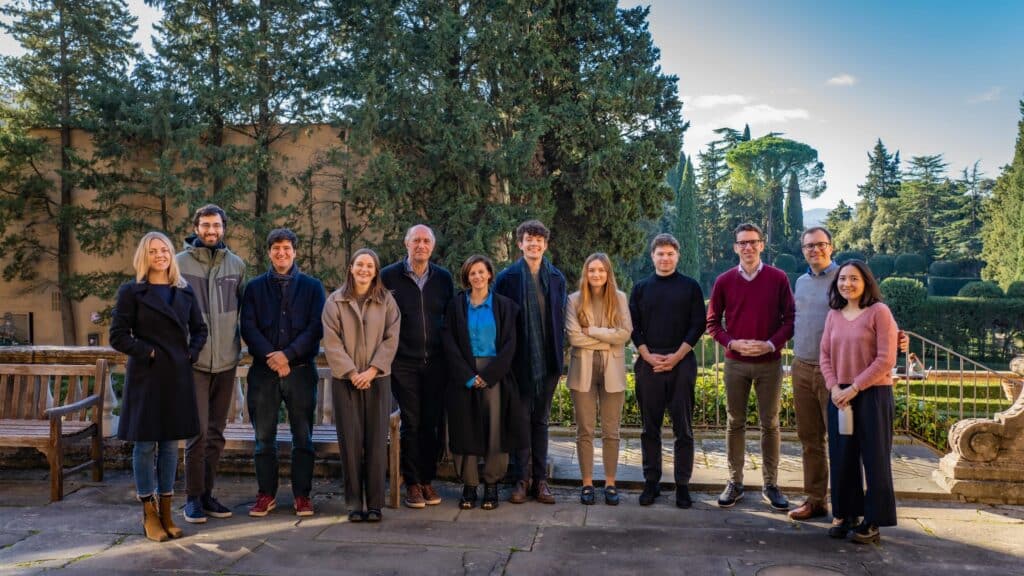20 years of the FSR. 22 years of FSR Training
This is the first installment of the Topic of the Month 'Back to School: A Journey into FSR Training'
On 3 July 2024, the Florence School turns 20. In fact, the FSR opened on 3 July 2004 with its first event, the first Regulatory Policy Workshop on the Internal Energy Market held at Villa La Fonte.
Looking back: 22 years of FSR training
In reality, training for energy regulators had started even before the FSR was launched. in March 2002, a two-week residential course was organised in Mallorca by Prof. Ignacio Pérez-Arriaga, founder and first Director of the Instituto de Investigación Tecnológica at the Universidad Pontificia Comillas in Madrid and former commissioner in the Spanish Electricity Regulatory Authority (Comisión del Sistema Eléctrico Nacional – CSEN). The course was meant to train staff of the existing energy regulatory authorities of European countries and experts from some of them participated as instructors. The course was repeated the following year in Florence and, as soon as the FSR was established in 2004, became the first course to be offered by the new School. At the same time, Prof. Pérez Arriaga, became Director of Training at the FSR.
There is a background to this development. It dates back to 1997, when the Italian, Portuguese, and Spanish energy regulators started to meet on a regular basis, first in San Sebastian (Spain), then in Milan, Lisbon, Seville and Rome, to discuss and exchange practices in a range of regulatory topics, with an increasing focus on the implementation of the EU Internal Electricity Market. The three delegations were led by the presidents of the respective authorities: Pippo Ranci, Jorge Vasconcelos and Miguel Ángel Fernández Ordóñez. Prof. Pérez-Arriaga also attended the meetings since he was the member of the Spanish Authority in charge of European matters. Jacques de Jong – chairman of the Dutch regulatory authority – joined this group sometime later. Those meetings planted the seed of regulatory cooperation in Europe, out of which, in 2000, the Council of European Energy Regulators (CEER) was established. They promoted the organisation of the first European Electricity Regulatory (Florence) Forum in February 2008, which was hosted by the European University Institute in Villa Schifanoia, the current headquarter of the FSR. They also cemented the good personal, as well as professional, relationship between the presidents and the senior members of the three regulatory authorities.
This relationship was instrumental in the creation of the FSR. The proposal to Prof. Pérez-Arriaga to teach the seminal course in Majorca in 2002 came from Jorge Vasconcelos, Pippo Ranci and Jacques de Jong in March 2000 during a farewell dinner at the end of the term of Prof. Pérez-Arriaga as member of the CSEN. Given the success of the course and the need for capacity building in energy regulation in the EU, the creation of the FSR was conceived and implemented by Jorge Vasconcelos, still at the helm of ERSE, the Portuguese regulator, and first President of CEER in the early 2000’s. He called Prof. Ranci, who had just completed his mandate as President of the Italian regulator, to become the first FSR Director and Prof. Pérez-Arriaga to become the first Director of training at the new School.
Back to that first course in Mallorca: in the following years it gave way to the two longest-running training courses of the FSR: the Annual Training on the Regulation of Energy Utility, which was offered, for the first time, in 2005 – 2006 academic year, and the Summer School on the Regulation of Energy Utilities, a one-week course offered for the first time in June 2005. Both training programmes are still running nowadays and Prof. Carlos Battle succeeded Prof. Pérez-Arriaga as the course director.
The Annual Training was initially only residential and taught intensively in two weeks. Later, written material for each topic was prepared and the course was structured in three blocks – the first and the last ones taught in Florence over a week each, and a longer second one, delivered online, over several months. This restructuring was implemented in stages: in 2006 and 2007 with shorter versions (February to June and January to September, respectively) and, in October 2008, it reached its present format, extending over the standard academic year (typically from October to June).
Over time, beyond these two training courses on general regulatory topics, the FSR developed more specialised ones. Initially, these courses were organised on an ad-hoc basis. Only later, a portfolio of courses run regularly on an annual basis was developed.
The first advanced course on Electricity Markets was offered in March-April 2008. One year later, in March 2009, the first course on Gas Markets was launched under the new FSR leadership of Prof. Jean-Michel Glachant.
Soon afterwards, the FSR started to be asked to organise what, later on, came to be referred to as ‘tailor-made’ training courses. In 2010, the FSR organised a series of training courses on request from MedREG, the Association of Mediterranean Energy Regulators. Two of these courses were delivered in Algeria and Cyprus.
In 2011, a second Summer School, on EU Energy Law and Policy, was opened by Prof. Leigh Hancher as a week-long residential course. It ran for eight editions until the summer of 2018.
In 2012, the FSR organised its first course in South America: it was a dedicated course for the Brazilian National Agency for Petroleum, Natural Gas and Biofuels delivered in Rio de Janeiro in three residential blocks.
In 2013, the FSR joined forces with the Vlerick Business School to offer a Future Power Grid Managers Programme. Another joint initiative was the training course on the Fundamentals of Energy Regulation, launched in 2014 in cooperation with CEER. The course, with Ilaria Conti as the FSR course director, was run for six editions as a residential one-week course in Brussels, was suspended in 2020 due to the COVID pandemic, and resumed in 2021 as an online course; its last edition was run in 2022.
Over the years, the training offering has evolved in parallel with developments in the energy sector.
For example, as the share of renewables in the energy sector continued to increase, creating new challenges for the energy systems, the FSR launched its training course on the Regulation and Integration of Renewable Energy. The adoption of the Trans-European Networks for Energy (TEN-E) Regulation also inspired the development of training, which ran for a few editions. Also, as ‘network codes’ were developed to implement the Third Legislative Package on energy, the FSR launched two dedicated training courses, one on the electricity network codes, in cooperation with the European Network of Transmission System Operators for electricity (ENTSO-E), which was launched in 2017, and one on the gas network codes, in cooperation with the European Network of Transmission System Operators for gas (ENTSOG), which was launched the following year.
More recently, as the European Union first proposed and then adopted the Clean Energy Package for all Europeans, and the FSR followed suit with a new course on the Package, whose first edition was run already in 2018, during the legislative process, to provide participants with insights not only on the content of the proposed legislation, but also on the ongoing debate among co-legislators. In 2021, this course was replaced by the training course on the EU Green Deal, in line with the new EU energy and climate policy. New legislation for the gas sector inspired the course on clean molecules; again we introduced the course during the ongoing legislative process.
In the meanwhile, in 2014 the FSR started to offer courses totally online. The first of this type was the Regulation of the Power Sector Course. This course started from a book with the same title by Prof. Pérez-Arriaga and his colleagues from Comillas University. The FSR team led by Annika Zorn turned the book into an online course. The format we currently follow for online courses with “quizzes”, “forum discussions”, “live classes”, “office hours”, “mastery challenges”, etc, has been co-created by the professional staff, the course directors and instructors in the FSR community. The experience gained with online courses in the following years allowed a swift and seamless transition to a fully online School when the COVID pandemic struck in 2020. It also allowed the FSR to offer its training to a wider audience, including by covering issues more related to the developing world, for example with the launch, in 2020, of a new online course on Regulation for Sustainable Development Goal 7.
In 2016 the FSR launched its first Executive Course, to master Electricity Markets, which has reached its seventh edition.
In 2021, the Regulatory Delivery course, which has been offered online since 2019, became the first course to be made available in two languages, English and Portuguese, the latter edition targeted to the regulatory community in Brazil.
And so we come to the present days. In October 2022, Prof. Leonardo Meeus succeeded to Prof. Glachant as Director of the FSR. He worked with the executive education team led by Daniela Bernardo to restructure the training portfolio of the FSR, dividing it between ‘class’ and ‘community’ courses. The class courses, mostly run at least partly ‘in-presence’, are targeted to a limited number of participants – typically around 30 – and offer a more intimate learning experience, with a closer and more dynamic interaction between the participants and the instructors. The community courses attract wider participation – in some cases exceeding 100 – and are run online, thus offering the possibility of attendance also to participants based in far-away places around the world.
The FSR Training Portfolio
The following table presents our 2023 portfolio of regular training courses:

Tailor-made courses
The FSR has also an expanding practice offering tailor-made courses to a wide range of beneficiaries, from staff of international organisations to officials in regulatory authorities to employees of companies operating in the energy sector. Over the last three years (2020, 2021 and 2022) Prof Alberto Pototschnig, Deputy Director of the FSR, worked with the executive education team and the many experts in the FSR community to design, develop and deliver 16 tailor-made training courses. for a broad audience based in Europe, Africa and Asia. Three courses were organised in the framework of a European Project on Liquefied Natural Gas (LNG) and addressed energy experts from Asia, Africa, the Middle East and the Mediterranean region. Other courses were part of a three-year capacity building project for regulators in the Asia-Pacific region, organised in collaboration with the United Nations’ Economic and Social Commission for Asia and the Pacific. Many courses in recent years targeted European professionals from the public and private sectors, focusing on the EU policy approach in addressing current environmental concerns and climate change issues, as well as the development of energy and climate regulatory initiatives. A wide variety of topics were covered including decarbonisation, LNG and gas market design, EU energy and environmental policies, electricity markets integration, water and sanitation services, sustainable power system connectivity, renewable energy, electricity sector liberalisation and energy trading.
Over the last 20 years, nearly 11,000 participants from more than 130 countries attended the FSR courses.
The FSR is committed to keep its training courses up to date with the latest policy and regulatory developments. We ensure this by taking advantage of the unique combination of training, research, and policy debate activities at the FSR, as well as of the close link we have with the most relevant European institutions (as, for example, represented in our Advisory Board).
We also want our training to be available to the widest possible audience. To promote knowledge sharing also to the benefit of the less advantaged, the FSR has developed several scholarship programmes, each targeted to a specific cohort of energy sector stakeholders.
The FSR is also leading the initiative, by a number of African, American and European parties, to create an African School of Regulation (ASR), replicating the FSR model in Africa. Prof. Pérez Arriaga is the ASR Interim Director, until the ASR is fully established as an African School run in Africa, by Africans for Africans.
Learn more
The First FSR Alumni Day – 27 October 2023
As the 20th Anniversary approaches, the Florence School of Regulation invited the Alumni community in Florence. Learn more






